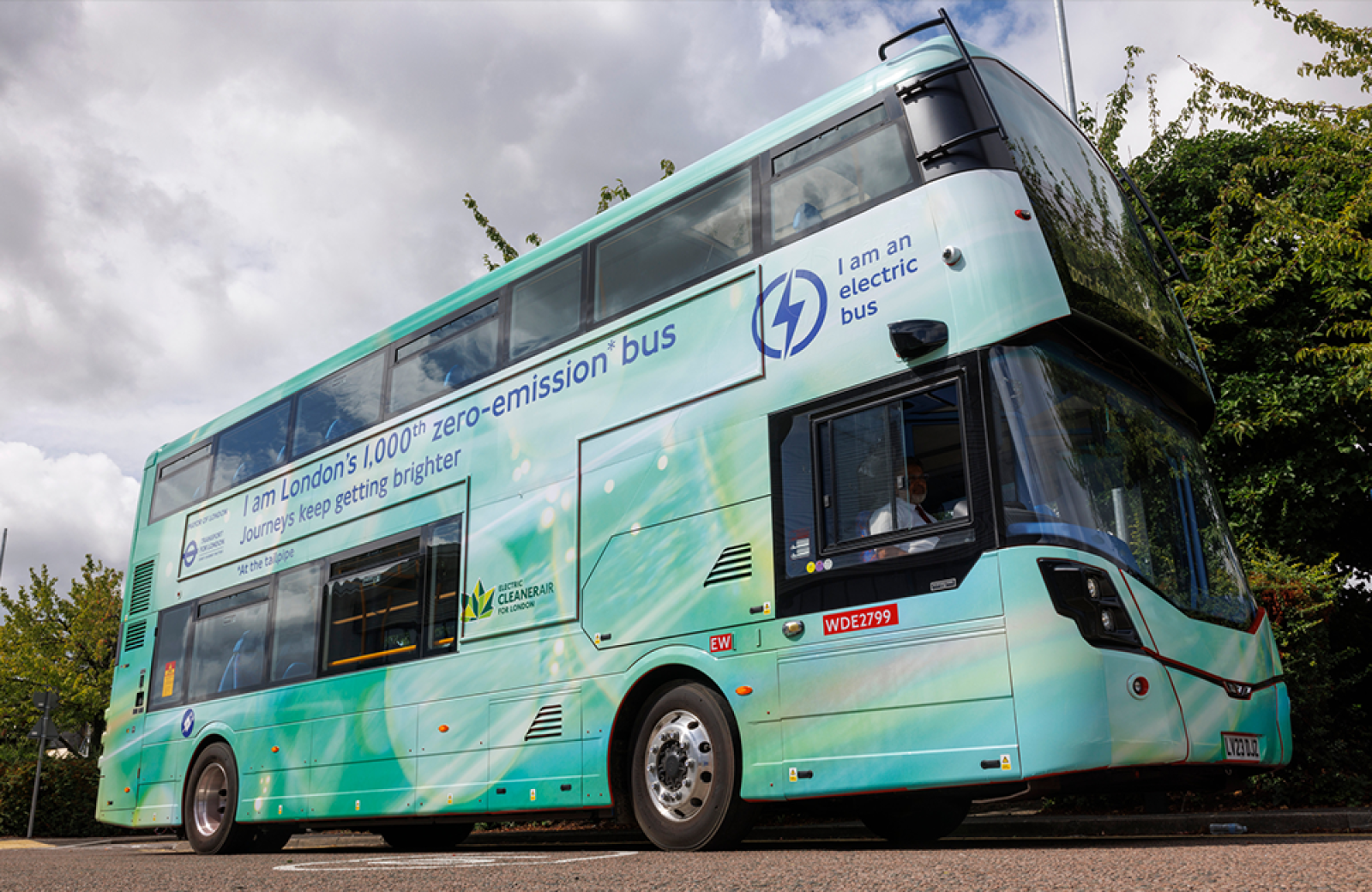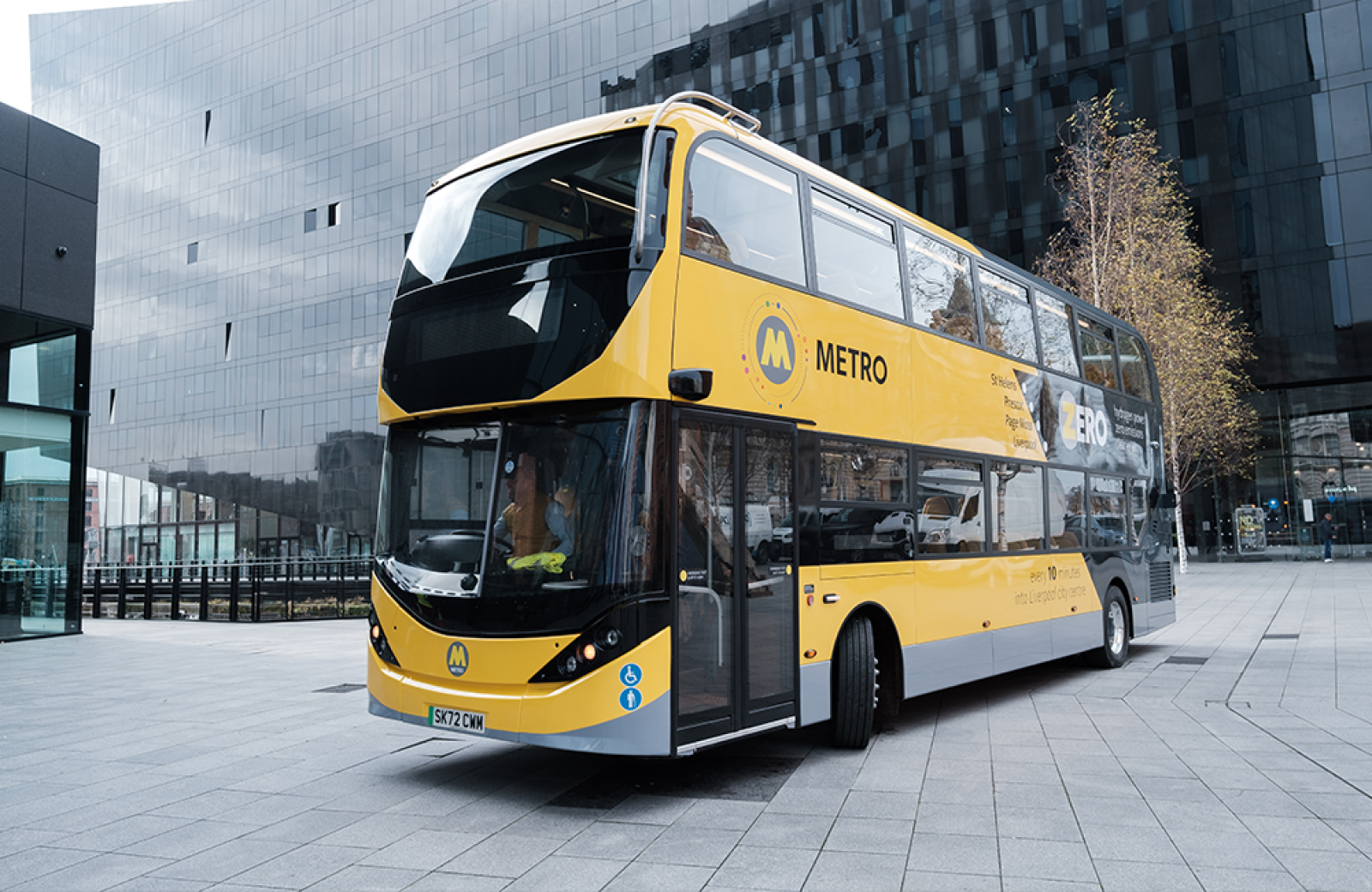A Smoother Ride
Unlocking a green bus revolution
Buses are the backbone of the country’s transport network and key to enabling modal shift to sustainable, accessible and affordable public transport.
Among the Government’s five policy missions is to ‘make Britain a clean energy superpower’ with the aim of cheaper, zero-carbon electricity by 2030 and ‘accelerating to net zero’.
At 26% of greenhouse gas emissions, transport remains the largest emitting sector in the UK. Within that, cars and taxis are the largest contributor to domestic emissions, at 57%. Buses account for only 3% of road transport emissions but Zero Emission Buses (ZEBs) have a crucial role to play in achieving modal shift away from polluting private vehicles. Transport authorities will need to achieve very significant levels of modal shift to realise their overall targets to decarbonise their networks and achieve net zero.
This report explores how the benefits of ZEBs can be realised and rolled out more rapidly. It looks at the local and national policy reforms, funding arrangements and manufacturing capacity needed to unlock the delivery of ZEBs and fulfil fleet decarbonisation goals.

Green Fleet Roadmap
According to the latest available Department for Transport Bus Statistics, by the end of March 2023 around:
- 30,200 buses were in operation across England, 16,500 of which were in the English Metropolitan areas and in London
- 1,200 of these were ZEBs, of which:
- 1,000 were ZEBs operating in London;
- Over 200 were ZEBs operating in the Metropolitan areas;
- A further 100 ZEBs were operating elsewhere in England.
This leaves an estimated 29,000 buses in England still needing to switch to to zero emission operation to achieve a fully zero emission fleet. Of these, around 15,000 ZEBs are required in London and the Metropolitan areas alone.

Cross sector change needed to unlock a green bus revolution
The report was supported by research from consultants EY, through which ZEB manufacturers were interviewed to understand the capacity of the domestic supply chain to support the transition to ZEBs.
It identifies a series of challenges and recommendations on how to overcome them.
Policy Environment
- Government should provide certainty on the end of sale date for new, non-zero emission buses, to give confidence to manufacturers and empower operators to develop and bring forward plans to decarbonise their fleets.
- The end of sale date must be proportional and be accompanied by a long-term and sustained funding settlement to support the ongoing procurement of ZEBs and comprehensive plan to address charging and infrastructure needs.
- Set a target to mandate the provision of ZEB charging infrastructure in the context of expectations for vehicle delivery.
- Deliver a national charging and hydrogen refuelling infrastructure strategy for buses and other Heavy Duty Vehicles covering both depots and public locations. Such a strategy should recognise the integral role of local and regional authorities, who should be given greater control over the planning of power infrastructure and associated planning tools, supported by adequate upskilling and funding.
- The government must advocate for modal shift away from private cars, championing pro bus policies and bus priority measures as part of a broader narrative to promote public transport and active travel as a means to helping achieve net zero and economic growth.
Funding
- Set out plans for a longer-term stable funding stream for ZEB procurement, in order to avoid the current boom/bust approach and give confidence to private investors. Extend these funding opportunities to all areas with capacity to deliver.
- Make available an innovation fund for trial projects and evaluating new technologies in live settings.
- Government should lead on expanding alternative financing option expertise sharing across transport authorities and enabling authorities to access the most appropriate mechanisms.
- Government should help facilitate a whole industry approach to delivering a long-term funding solution.
- Provide long-term certainty of overall bus revenue funding, addressing the funding cliff edge facing authorities and operators in 2025.
- In the case of BSOG reform, continue BSOG uplift for ZEBs, with the rate reviewed regularly to ensure it considers any increases in hydrogen and electricity costs as the demand increases.
Manufacturing and Delivery Capacity
- The Department for Transport, working with manufacturers, operators and transport authorities, should explore opportunities for encouraging operators and authorities make bulk orders across regions to achieve cost savings.
- Support the UK ZEB supply chain by giving confidence through long-term policy and funding to ensure local suppliers can continue to build capacity and support economic growth.
- Recognise the role that ZEBs and their associated supply chains could play in the future of UK manufacturing by considering the sector and the certainty it requires as part of the new National Industrial Strategy.
- The Department for Transport should work with operators to set out advice and share expertise across transport authorities on how the role of SMEs fits into the wider progress towards electrification, including fleet procurement, to address challenges SMEs face compared to larger operators.
- Transport Authorities should publish annually updated ZEB procurement pipelines, once they have the clarity over their bus operation models, to keep manufacturers abreast of future requirements.
- Deliver the vision and commitments made in the 2023 UK Battery Strategy to give confidence to ZEBs manufacturers, enable them to develop local supply chains and local skills, and boost confidence for private investment.
- Implement the recommendations set out in Labour’s Plan for the Automotive Sector that will accelerate domestic battery production, develop domestic supply chains and increase grid capacity.
Opportunities for Standardisation and Efficiency
- Work with manufacturers, operators and authorities to obtain a clear direction on viable common charging and safety specifications to drive efficiencies and achieve economies of scale.
Depot Infrastructure and Grid Connections
- Explore ways of simplifying and creating a nationally consistent process for installing charging and refuelling infrastructure at depots.
- Provide long term certainty over funding streams available for depot electrification to ensure infrastructure is in place and ready to serve accelerated vehicle procurement timelines.
- The Department for Transport to lead on providing further guidance and knowledge sharing around best practice on depot electrification.
- Working with transport authorities and operators, DfT to develop ZEB safety guidance, particularly addressing battery fire safety and vehicle safety at depots.
- Working with Ofgem, Government to introduce a new statutory duty on Distribution Network Operators (DNOs) to prioritise grid infrastructure that will deliver social and community benefit, such as electrification of bus depots.
- Support and accelerate strategic engagement with DNOs to understand the necessary pipeline of investment for enhancing grid capacity.
- Develop a national electrification strategy to set standards and commitments for depot electrification, allowing more clarity and less risk to operators and manufacturers.
- Explore options for developing strategically located shared charging facilities to be shared by multiple operators and vehicle types.
Innovation and Alternatives to Battery Powered Buses
- Speed up the commencement of hydrogen transport hubs across the UK with a roll out strategy for a network of national hydrogen refuelling infrastructure.
- Update planning regulations accordingly so that hydrogen infrastructure can be more efficiently approved and implemented.
- Give certainty over the supply of green hydrogen for bus and coach operators and ensure operators can access shared refuelling sites.
- Provide financial support to roll out alternative fuels and undertake hydrogen bus trials.
- Explore support for repowering trials to achieve assurance that the process is safe, the supply chain is robust and to assess the relative operational performance of repowered vehicles.
The prize of getting more zero emissions buses on our streets is huge – from lower emissions and cleaner air to supporting economic growth through new jobs and increasing bus passenger numbers through modal shift from private car use.
This report sets out the opportunity for the transport sector to work hand-in-hand with Government to unlock a green bus revolution.
Whilst progress has been made over the last decade, in order to achieve the bus fleet decarbonisation targets set by city regions, the delivery of ZEBs must be accelerated at pace.
The challenge ahead is considerable and time is running out. With the manufacturing sector confident they are able to step up to meet the demand and authorities and operators ready to face up to the challenge, positive rhetoric and potential now must be supported by the right funding, policy and engagement instruments. Without urgent progress across all of these policy areas, it is unlikely that current decarbonisation targets will be met.
Bus and coach only contribute 3% of total transport emissions. Therefore, it is crucial to view the decarbonisation of bus fleets in the wider policy goal of modal shift. A joined up policy programme across transport modes that would support transport authorities in delivering integrated, sustainable, accessible and affordable public transport solutions must be at the core of this challenge.
Further reading
Report
A Smoother Ride – Can capital investment deliver more efficient bus services?
Report

